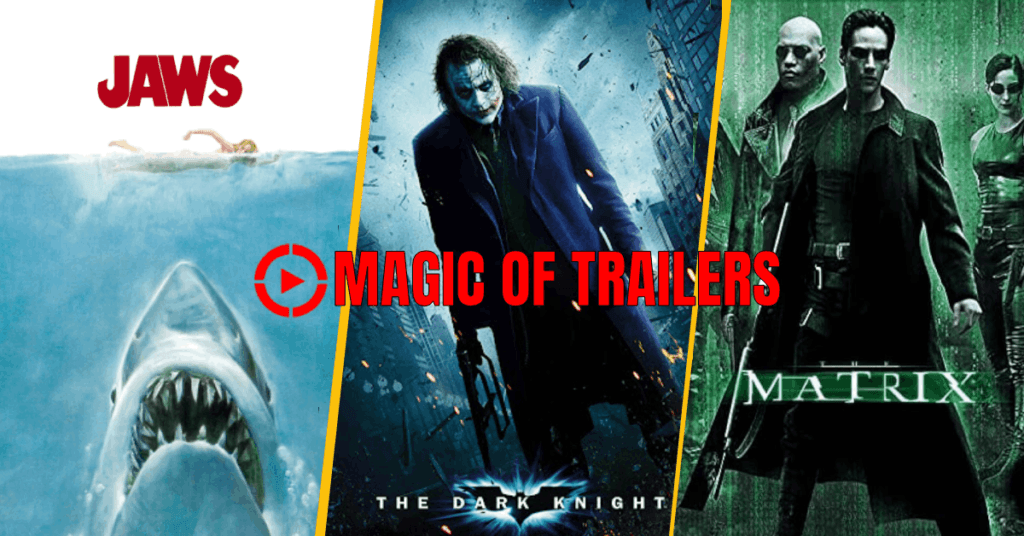Why Do We Even Need Movie Trailers?
Imagine stepping into a theatre, knowing absolutely nothing about the film you’re about to watch, no clue about the genre, the cast, or even the plot. Exciting? Maybe. But for most people, it’s like jumping into a swimming pool without checking if there’s water. A complete nightmare.
Enter movie trailers, the tantalizing appetizers of the cinematic world. They give us just enough to tease but never enough to fully satisfy. They build anticipation, set expectations, and when executed perfectly, become pop culture moments in their own right. From the menacing two-note score of Jaws (1975) to Heath Ledger’s spine-chilling Joker laugh in The Dark Knight (2008), movie trailers have evolved from simple previews to full-fledged storytelling experiences. But what exactly makes a great trailer? A stellar trailer isn’t just a bunch of random shots thrown together; it’s a mini-movie, meticulously crafted with its own rhythm, structure, and emotional beats.
Grabbing Attention Instantly
Filmmakers know our attention spans are shorter than ever. The first few seconds of a movie trailer need to shock, excite, or intrigue; otherwise, the audience scrolls away. The Dark Knight (2008) kicks off with Heath Ledger’s eerie voice: “Where do we begin.” Instantly, the tone is set, and we know we’re in for something special.
Atrailer’s background score isn’t just an accessory—it’s the heartbeat of the entire experience. Inception (2010) gave us the infamous “BWAAAM” sound, so impactful that it became the go-to sound effect for action and sci-fi film trailers for years. Mad Max: Fury Road (2015) used fast, rhythmic drum beats to enhance its relentless, high-octane chaos.
Some trailers opt for a slow-build mystery, creating intrigue (Interstellar, Joker). Others dive headfirst into a non-stop adrenaline rush, bombarding us with action (John Wick, Fast & Furious). The right editing choices make or break a trailer. Logan (2017) paired its gritty visuals with Johnny Cash’s “Hurt”, letting the emotion build gradually. Avengers: Endgame (2019) went for a montage of past films, combined with dramatic voiceovers, making it feel like the culmination of an era.
A single, powerful line can sell an entire movie and cement itself into pop culture history. The Matrix (1999) – “Unfortunately, no one can be told what the Matrix is. You have to see it for yourself.” The Social Network (2010) – “You don’t get to 500 million friends without making a few enemies.” The Batman (2022) – “I’m vengeance.” That one line was enough to send fans into a frenzy.
More Articles for You:
- The Role of Women in Filmmaking
- 5 Hindi Movies of 2024 That Prove Small Budgets Can Create Big Impact
The Psychology Behind Iconic Villains: Why We Love to Hate Them
The Magic of Cinematography: Visuals Speak Louder Than Words
Art of Hiding
While great movie trailers build anticipation, some misfire by revealing too much. A notorious example is Terminator Genisys (2015), which spoiled the film’s biggest plot twist in its trailer. Batman v Superman: Dawn of Justice (2016) was also criticized for showing Doomsday, a reveal that could have been a thrilling surprise in the movie itself. This trend raises a question: should film marketing maintain mystery rather than spoon-feed key moments? Audiences increasingly crave movie trailers that hint rather than explain, preserving the magic of discovery.
The way we consume content is evolving, and movie trailers are adapting right along with it. AI could soon personalize what audiences see, tailoring content to individual preferences based on their viewing history. Virtual reality might make watching atrailer an interactive experience, placing audiences inside a scene. And with social media reigning supreme, bite-sized, TikTok-style mini-trailers could become the new norm—short, punchy edits designed for instant impact.
The Ultimate Seduction Game
At their core, movie trailers are the ultimate seduction game; they give us just enough to lure us in, but never enough to fully satisfy. They’re like magic tricks: if you reveal too much, the illusion is ruined.
Hollywood has perfected film marketing formula, turning movie trailers into miniature cinematic masterpieces that make us laugh, cry, and scream in excitement—all in just two minutes. So, next time you feel chills running down your spine while watching a trailer, remember it’s not just film promotion. It’s cinema in its purest, most distilled form.
